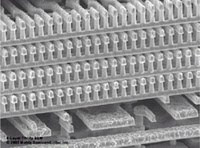 Egy új polimer könnyebbé teszi az adattároló rendszerek munkáját.
Egy új polimer könnyebbé teszi az adattároló rendszerek munkáját.Engineers in Korea have created a material that could allow super-dense "millipede"-style data storage systems to work at room temperature. The discovery brings the technology closer to commercial reality. A decade ago, IBM engineers unveiled the ultra-high-density "millipede" data storage system. Now more than ever, people who want to store digital photos and video need this probe storage system – which can cram a terabit, or 125 gigabytes, into every square inch – but IBM's and other systems with similar designs remain frustratingly distant. Millipede and other similar systems work on a simple principle: an incredibly sharp needle – the probe – etches data as a series of nanoscale pits in a tough polymer surface, and the same probe feels for what's been written to read it back. But to punch a hole in the hard polymer surface the probe had to be hot enough to make the polymer temporarily pliable. Raising a probe to the 350 °C necessary for each digital 1 and 0 to be written makes the system power-hungry, and that is keeping probe storage from the market, says Jin Kon Kim at Pohang University of Science and Technology in Kyungbuk, Korea. His team has designed a probe storage system that doesn't need heat to function. Instead, it uses an unusual "baroplastic" – a hard polymer that becomes soft when placed under pressure. The first such materials were found a decade ago, but became soft only under high pressures of above 300 bar. Kim's team has created a new baroplastic that goes through the transition at the much lower pressure of 60 bar: "the lowest value among all block copolymers reported in the literature." The Korean team has shown that the tip of an atomic force microscope (AFM) can etch the kind of tiny pits that store data in millipede-like systems simply by pressing on the new material. Lighter pressure can be used to feel for and read out the pits without altering them. It solves one issue but raises another, says David Wright, who co-ordinates Protem, a Europe-wide project to explore the potential of probe storage. "The forces needed are relatively high, and this is likely to lead to tip wear issues," he says. Even systems that use heat suffer such problems, and they would be worse if more force was being used, he says.
IT3 komment: Manapság a számítógépekben a nem felejtő adattárolók közül a legelterjedtebbek a mágneses adattárolók, ezek között is a merev lemezek a legnépszerűbbek. Az elmúlt 50 évben folyamatosan fel-felbukkantak ponteciális vetélytársak, de eddig egyetlen komoly ellenfél sem akadt. Az IBM által az ezeredfordulón kifejleszett "millipede" technológia, a holografikus és lézeres adattároló megoldások mellett, egyike lehet a jövőbeli trónkövetelőknek.
Forrás: www.newscientist.com
Nincsenek megjegyzések:
Megjegyzés küldése